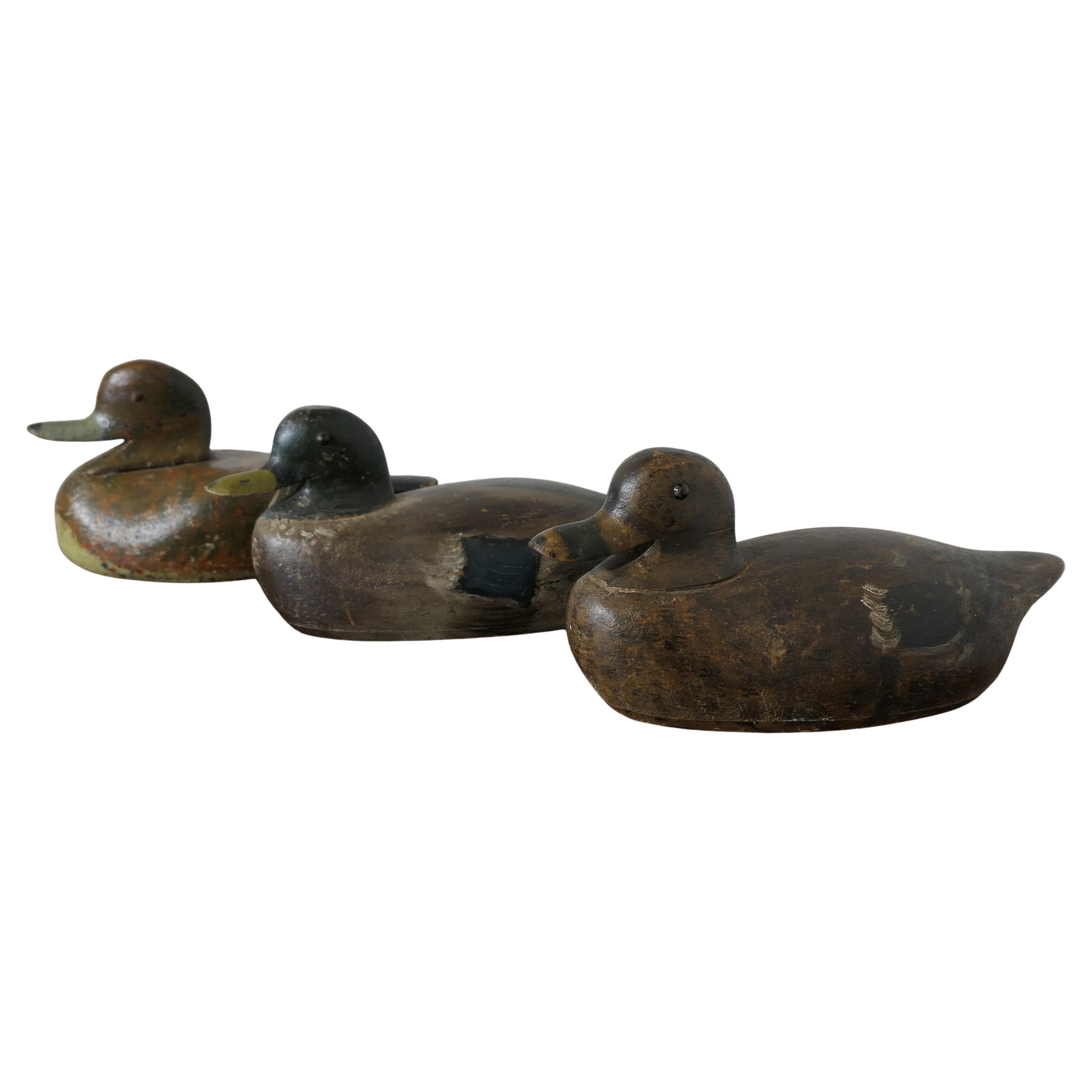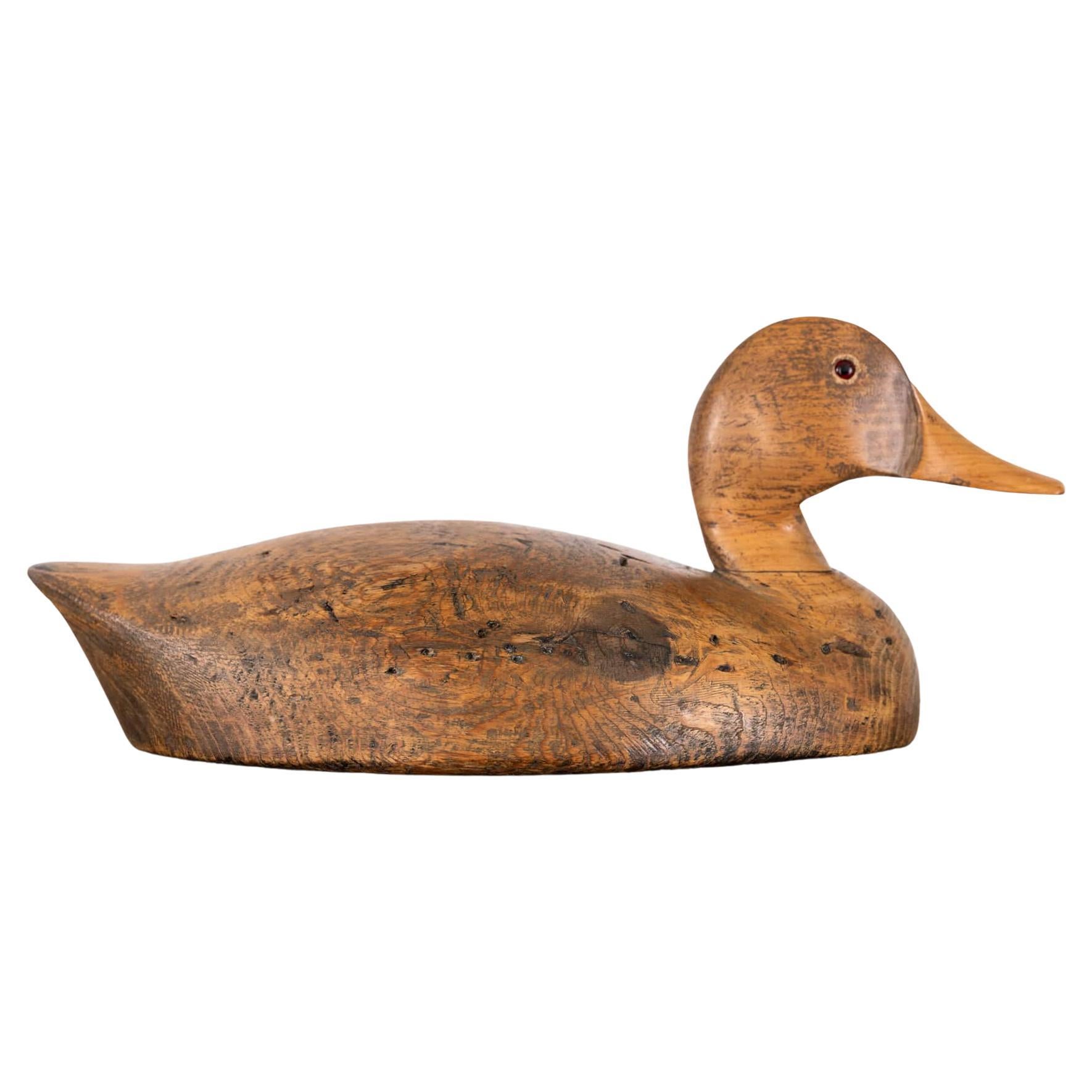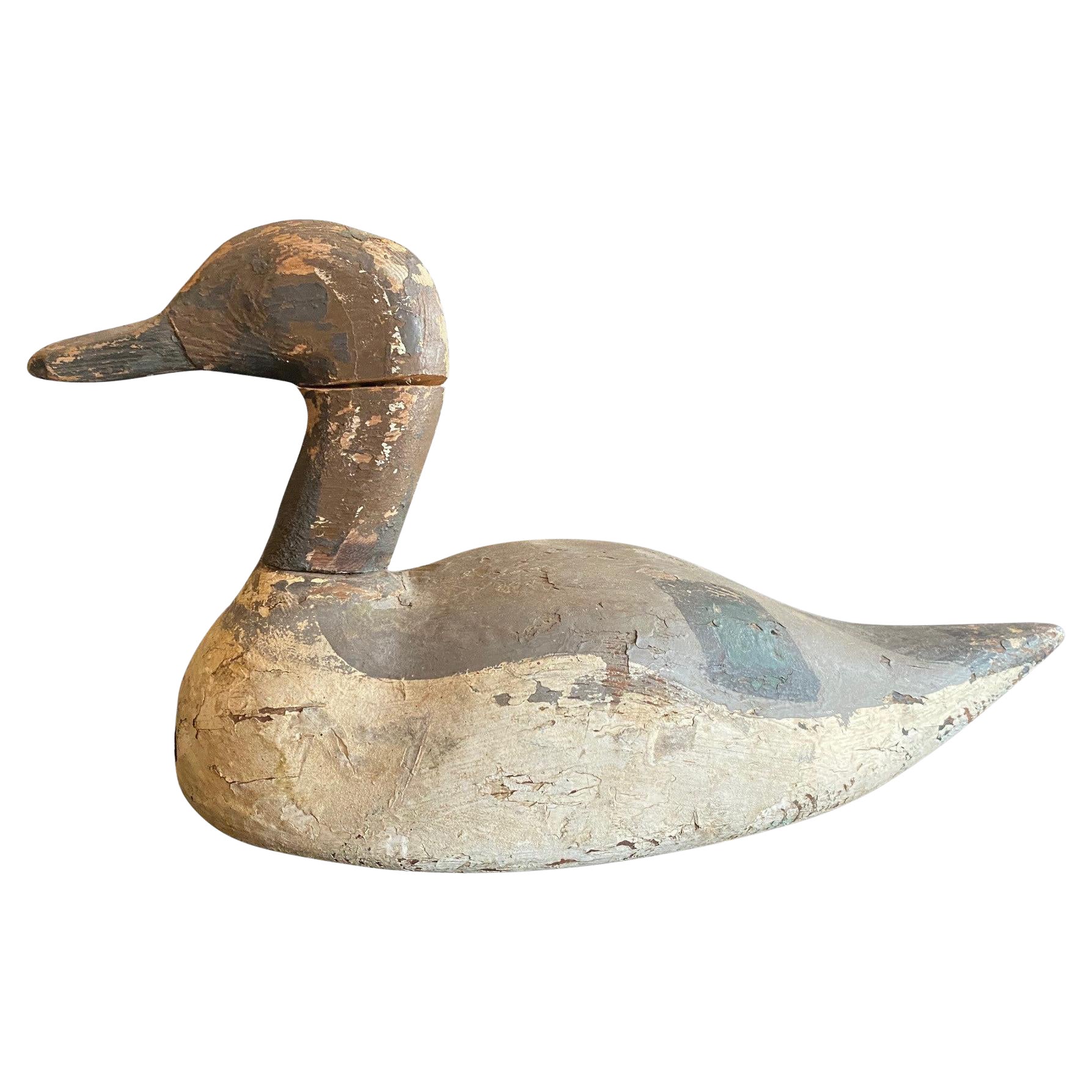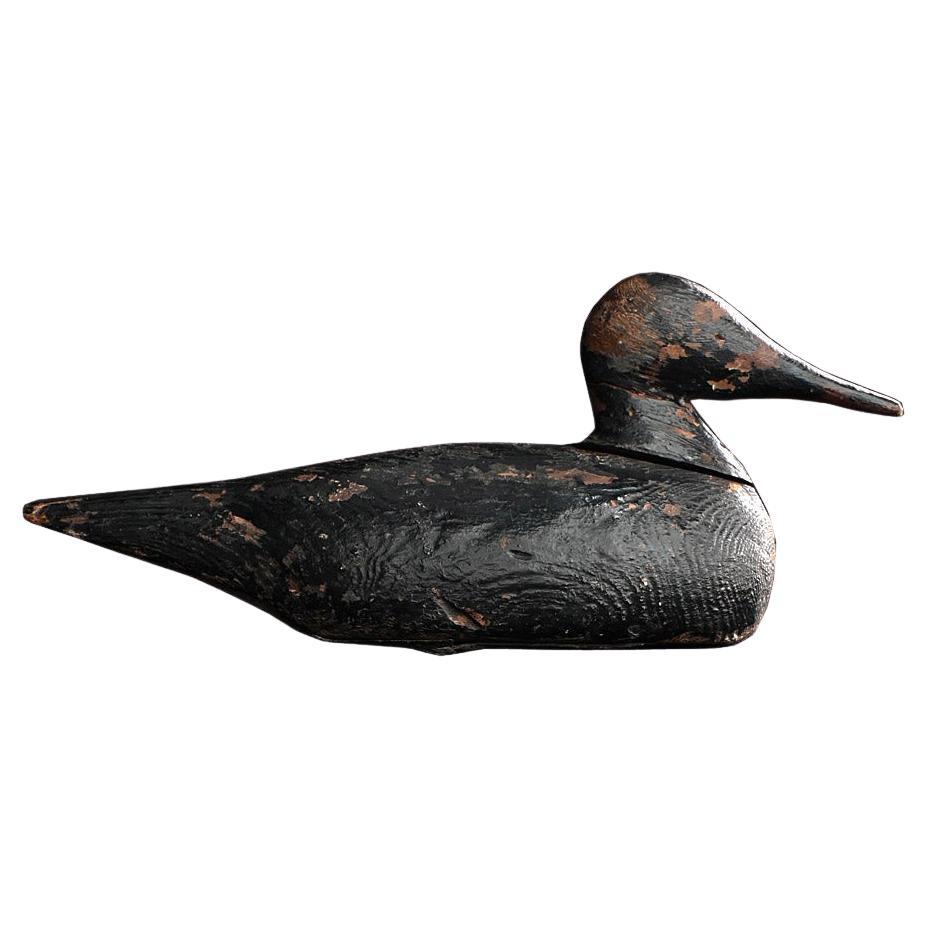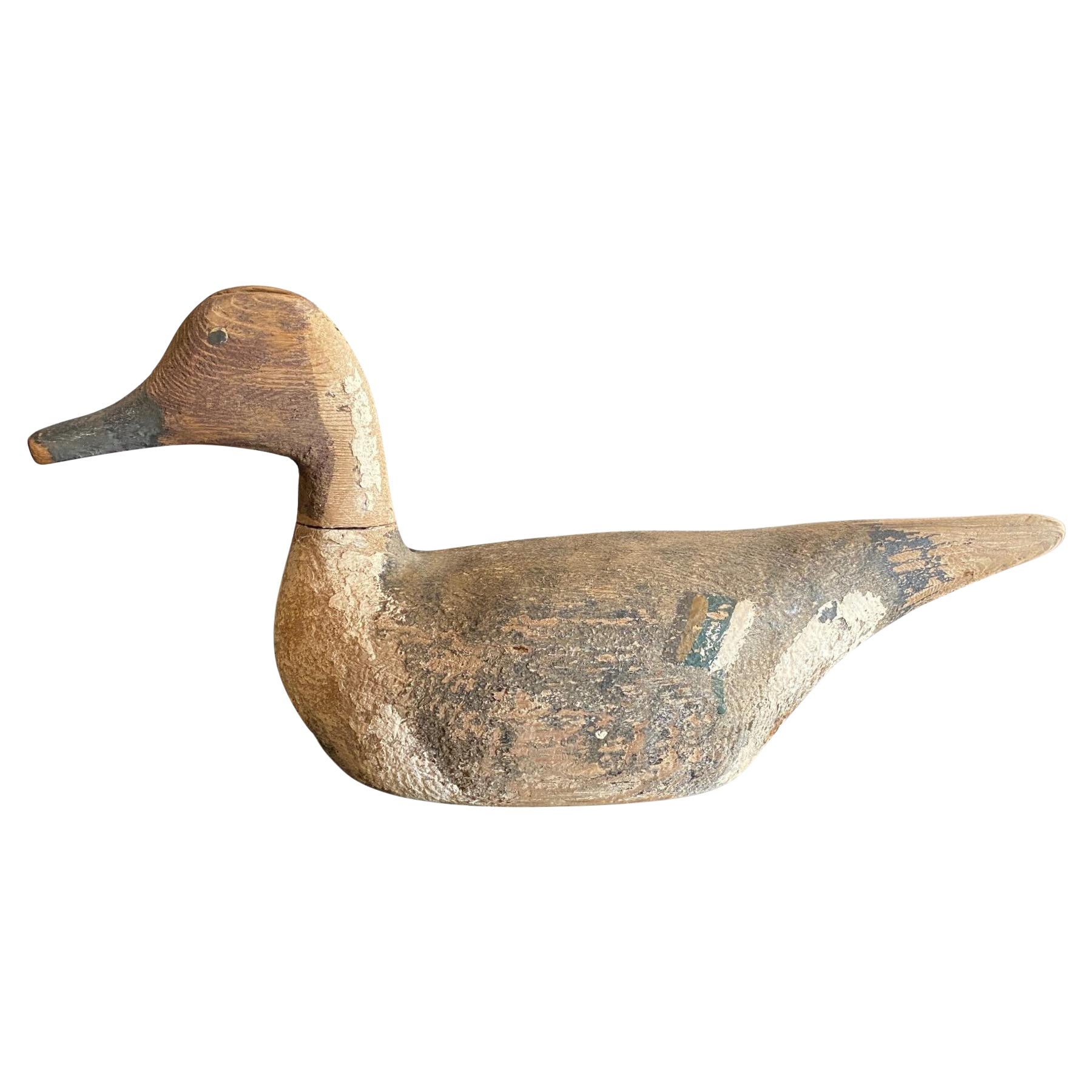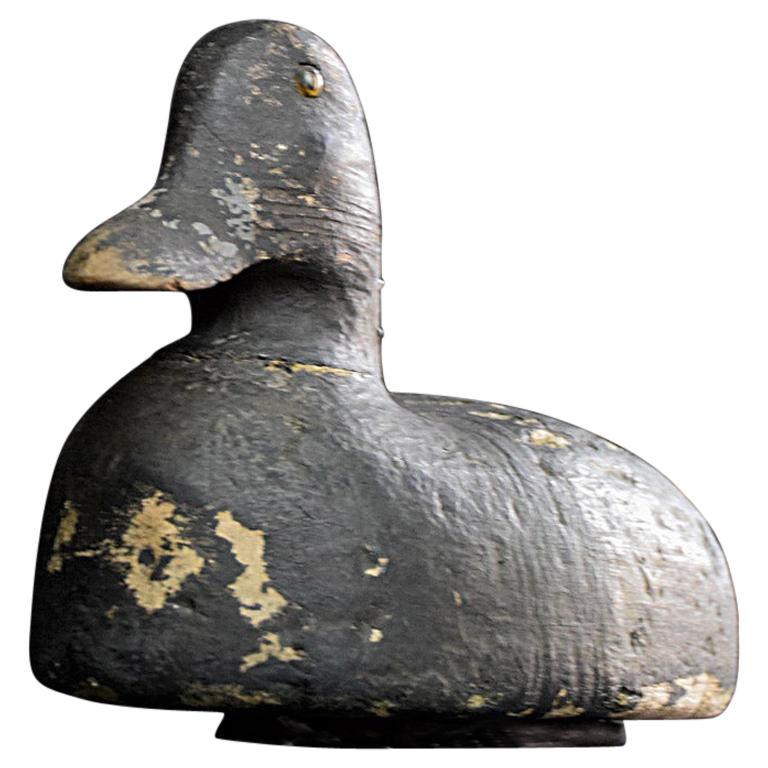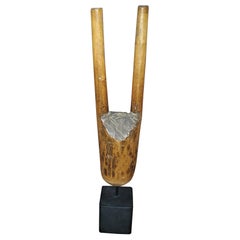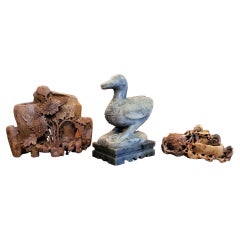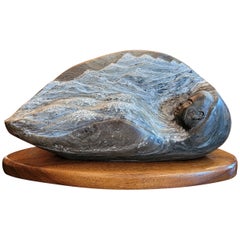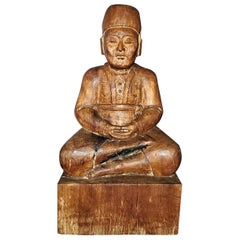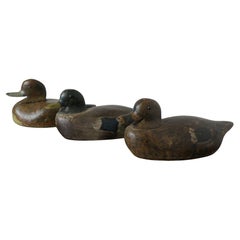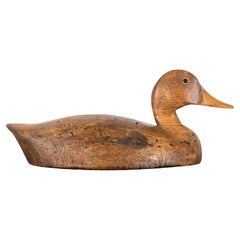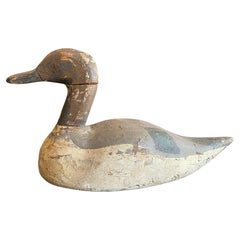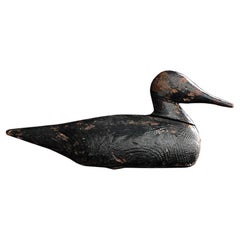Items Similar to Early 20C Mounted Duck Decoy Heads 2
Want more images or videos?
Request additional images or videos from the seller
1 of 11
Early 20C Mounted Duck Decoy Heads 2
$1,200
£908.21
€1,042.37
CA$1,709.50
A$1,853.99
CHF 973.79
MX$22,519.89
NOK 12,185.41
SEK 11,473.24
DKK 7,785.31
About the Item
Presenting a lovely early 20c mounted duck decoy heads 2.
This consists of 5 Duck Decoy heads from circa 1920 mounted on a wooden plinth.
This piece came from a wealthy estate in Dallas, TX with the mansion being built by a stockbroker in 1929. He was an avid ‘duck hunter’. His parents originated in Virginia and Kentucky and they may have brought them to Texas.
The Duck Heads are of different breeds of ducks and each has it’s original glass eyes.
The antique Duck Heads are each quite valuable and collectible, so to get 5 together is a real BONUS!
They can be wall mounted as decor, they can be wall mounted and used as a coat rack or they can be placed on a desk as an accessory.
We have a pair of these (hence the description as 1 and 2). Both are being sold individually BUT we will happily sell them to you as a pair, provided, one has not already been ‘snapped up’!
Perfect for Your Country Lodge!
- Dimensions:Height: 4 in (10.16 cm)Width: 23 in (58.42 cm)Depth: 6 in (15.24 cm)
- Style:American Craftsman (Of the Period)
- Materials and Techniques:
- Place of Origin:
- Period:
- Date of Manufacture:1920
- Condition:Repaired: Re-mounted. Wear consistent with age and use. Minor losses. Minor structural damages. Minor fading. Good original condition. Re-mounted.
- Seller Location:Dallas, TX
- Reference Number:1stDibs: LU3978132422502
About the Seller
4.9
Gold Seller
Premium sellers maintaining a 4.3+ rating and 24-hour response times
Established in 2015
1stDibs seller since 2018
395 sales on 1stDibs
Typical response time: <1 hour
- ShippingRetrieving quote...Shipping from: Dallas, TX
- Return Policy
Authenticity Guarantee
In the unlikely event there’s an issue with an item’s authenticity, contact us within 1 year for a full refund. DetailsMoney-Back Guarantee
If your item is not as described, is damaged in transit, or does not arrive, contact us within 7 days for a full refund. Details24-Hour Cancellation
You have a 24-hour grace period in which to reconsider your purchase, with no questions asked.Vetted Professional Sellers
Our world-class sellers must adhere to strict standards for service and quality, maintaining the integrity of our listings.Price-Match Guarantee
If you find that a seller listed the same item for a lower price elsewhere, we’ll match it.Trusted Global Delivery
Our best-in-class carrier network provides specialized shipping options worldwide, including custom delivery.More From This Seller
View AllVintage African Mounted Wooden Sculpture
Located in Dallas, TX
Presenting a lovely vintage African mounted wooden sculpture.
Made circa 1960 most likely in West Africa by the Luba Tribe.
It is a large wooden s...
Category
Mid-20th Century Cameroonian Tribal Sculptures and Carvings
Materials
Iron
Set of 3 Small Chinese Carved Soapstone Sculptures
Located in Dallas, TX
Presenting a lovely set of 3 small Chinese carved soapstone sculptures.
Made in China in the early 20th Century circa 1930.
This set comprises of:
1. A Medium/Tall mottled b...
Category
Early 20th Century Chinese Chinese Export Sculptures and Carvings
Materials
Soapstone
Sleepy Mountains Sculpture by RD Tsosie
By Robert Dale Tsosie
Located in Dallas, TX
Presenting a gorgeous piece of native American art, namely, “Sleepy Mountains” Sculpture by RD Tsosie, made from polished agate.
By the renowned Na...
Category
20th Century American Native American Native American Objects
Materials
Agate
Early 20th Century Indonesian Carved Wooden Seated Gentleman
Located in Dallas, TX
Presenting a glorious early 20th century Indonesian carved wooden seated gentleman.
This is Beautiful bit of ‘treen’ carved most likel...
Category
Early 20th Century Indonesian Folk Art Figurative Sculptures
Materials
Hardwood
Early 20th Century Cambodian Polychrome Male Figurine
Located in Dallas, TX
Presenting a lovely early 20th century Cambodian polychrome male figurine.
From circa 1900-1920 and from South Eastern Asia, most likely Cambodia bas...
Category
Early 20th Century Cambodian Country Sculptures and Carvings
Materials
Wood
Rare 19th Century English Tunbridgeware Hair Pin or Slide
Located in Dallas, TX
PRESENTING an EXTREMELY UNIQUE and RARE 19C British Tunbridgeware Hair Pin/Bobbin or Slide.
This slide is unlike any of it’s kind we have seen before, it is a VERY RARE survivor.
From circa 1860 – 80 and made in Tunbridge Wells, England.
Made of walnut with gorgeous marquetry inlay on the entirety of the front with classic Tunbridgeware micro-mosaic all over the front. The rear is walnut.
The marquetry inlay appears to be various different woods, namely, maple, walnut and satinwood.
Would have been worn in a Lady’s hair bun with the micro-mosaic facing forward.
This would have belonged to a VERY ELEGANT LADY in the mid to late 19th Century.
Tunbridge ware is a form of decoratively inlaid woodwork, typically in the form of boxes, that is characteristic of Tonbridge and the spa town of Royal Tunbridge Wells in Kent in the 18th and 19th centuries. The decoration typically consists of a mosaic of many very small pieces of different coloured woods that form a pictorial vignette. Shaped rods and slivers of wood were first carefully glued together, then cut into many thin slices of identical pictorial veneer with a fine saw. Elaborately striped and feathered bandings for framing were pre-formed in a similar fashion.
There is a collection of Tunbridge ware in the Tunbridge Wells Museum and Art Gallery in Tunbridge Wells.
The famous makers of Tunbridge ware were in the Tunbridge Wells area of Kent; their most notable work was from circa 1830-1900.
Early makers of Tunbridge ware, in Tunbridge Wells in the mid-18th century, were the Burrows family, and Fenner and Co. In the 19th century, around 1830, James Burrows invented a technique of creating mosaics from wooden tesserae. Henry Hollamby, apprenticed to the Burrows family, set up on his own in 1842 and became an important manufacturer of Tunbridge ware, employing about 40 people.
Edmund Nye (1797–1863) and his father took over the Fenner company when William Fenner retired in 1840, after 30 years in partnership with him. Thomas Barton (1819–1903), previously apprenticed at the Wise factory, joined the Nyes in 1836, and worked as Nye’s designer; he took over the business in 1863 and continued there until his death.
In Tonbridge (near to Tunbridge Wells), George Wise (1703–1779) is known to have had a business in 1746. It continued with his son Thomas, and Thomas’s nephew George (1779–1869), who took over in 1806. In its early years the company made articles such as workboxes and tea caddies with prints of popular views; later items had pictures created from mosaics. Their workshop in Tonbridge, Wise’s Tunbridge Ware Manufactory, was next to the Big Bridge over the Medway; the building was demolished in 1886 to widen the approach to the bridge.
Tunbridge ware became popular with visitors to the spa town of Tunbridge Wells, who bought them as souvenirs and gifts. Articles included cribbage boards, paperweights, writing slopes, snuffboxes and glove boxes.
At the Great Exhibition of 1851, Tunbridge ware by Edmund Nye, Robert Russell and Henry Hollamby was shown; Edmund Nye received a commendation from the judges for his work. He exhibited a table depicting a mosaic of a ship at sea; 110,800 tesserae were used in making the picture.
The manufacturers of Tunbridge ware were cottage industries, and they were no more than nine in Tunbridge Wells and one in Tonbridge. The number declined in the 1880s; competent craftsmen were hard to find, and public tastes changed. After the death of Thomas Barton in 1903 the only surviving firm was Boyce, Brown and Kemp, which closed in 1927.
Marquetry was an old technique which was continued by Nye and Barton to create images such as birds or butterflies.
‘Green Oak’ as caused by the fungus Chlorociboria aeruginascens.
Stickware and half-square mosaic was invented by James Burrows in about 1830: a bunch of wooden sticks of different colours, each having triangular or diamond-shaped cross section, were tightly glued together; in the case of stickware, the resulting block was dried, then turned to form an article such as the base of a pincushion. For half-square mosaic, thin slices were taken from the composite block, and applied to a surface.
Tesselated mosaic, was a development by James Burrows of half-square mosaic; it was adopted by George Wise and Edmund Nye. Minute tesserae were used to form a wide variety of geometric and pictorial designs.
Many sorts of wood were used for the various colours; about 40 were in regular use. Only natural colors were used; green was provided by “green oak”, produced by the action of fungus on fallen oak. Designs for articles were often taken from designs of Berlin wool work.
Category
Antique Late 19th Century English High Victorian Collectible Jewelry
Materials
Satinwood, Walnut
You May Also Like
3 Painted and Carved Decoy Ducks These are good 19th Century Decoys
Located in Godshill, Isle of Wight
3 Painted and Carved Decoy Ducks
These are good 19th Century Decoys they are carved they do have a little scuffing to the paint and the lead weights have been removed
The decoys are...
Category
Antique 19th Century Folk Art Decoys
Materials
Chestnut
Antique Hand Carved Folk Art Mallard Duck Decoy, C.1920
Located in London, GB
Two separate antique duck decoys. c.1920
Beautifully hand carved and very charming. One solid wood with a lovely warmth, the other carved and painted to mimic a male mallard.
Woo...
Category
Early 20th Century English Arts and Crafts Antiquities
Materials
Wood
Hand Carved Large Vintage Antique Wood Duck Decoy Sculpture, Early 20th Century
Located in Studio City, CA
A fantastic early to Mid-20th Century hand-carved and painted wood duck or mallard decoy. This piece has an wonderful color and texture.
From an impressive Los Angeles vintage duck and antique swan decoy...
Category
Early 20th Century American Folk Art Decoys
Materials
Paint, Wood
Early 20th century English estate made decoy duck.
Located in London, GB
Early 20th century English estate made decoy duck.
A true example of an early 20th century English estate made decoy duck form, with glass eyes. With a wonderful, pointed shape and p...
Category
Vintage 1920s British Folk Art Decoys
Materials
Pine
Hand Carved Large Vintage Antique Wood Duck Decoy Sculpture, Early 20th Century
Located in Studio City, CA
A fantastic early to Mid-20th Century hand-carved and painted wood duck or mallard decoy. This piece has an wonderful color and texture.
From an impressive Los Angeles vintage duck and antique swan decoy...
Category
Early 20th Century American Folk Art Decoys
Materials
Wood, Paint
Early 20th Century English Folk Art Decoy Duck Form
Located in London, GB
Early 20th century English Folk Art decoy duck form
A working example of an early 20th century English Folk Art decoy. Hand carved from wood, with lead weight still in place at the ...
Category
Vintage 1920s British Folk Art Decoys
Materials
Pine
More Ways To Browse
Duck Paint
Antique Glass Head
Duck Head
Antique American Folk Art Sculpture
Wall Mounted Antique Coat Rack
Duck Mount
Decoy Head
Wooden Cookie Molds
Craft Of Indian Art
Erotic Folk Art
Folk Art Root Carving
Oaxacan Art
Springerle Cookies
Vintage Anri Carvings
Whimsical Wood Carving
Wood Cookie Mold
Bellamy Eagle
Canadian Wood Carvings
